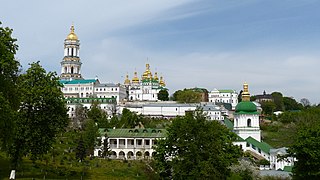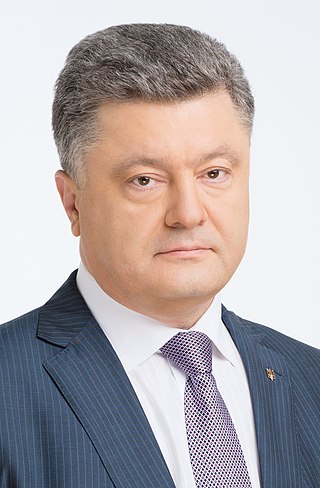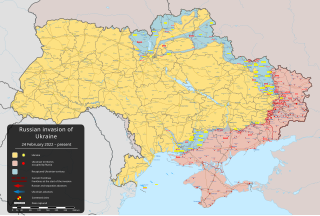
Ukraine is a country in Eastern Europe. It is the second-largest European country after Russia, which it borders to the east and northeast. It is also bordered by Belarus to the north; by Poland, Slovakia, and Hungary to the west; and by Romania and Moldova to the southwest; with a coastline along the Black Sea and the Sea of Azov to the south and southeast. Kyiv is the nation's capital and largest city, followed by Dnipro, Kharkiv, and Odesa. Ukraine's official language is Ukrainian; Russian is also widely spoken, especially in the east and south.

Vladimir Vladimirovich Putin is a Russian politician and former intelligence officer, serving as the current president of Russia. Putin has served continuously as president or prime minister since 1999: as prime minister from 1999 to 2000 and from 2008 to 2012, and as president from 2000 to 2008 and since 2012.

The Commonwealth of Independent States (CIS) is a regional intergovernmental organization in Eurasia. It was formed following the dissolution of the Soviet Union in 1991. It covers an area of 20,368,759 km2 (7,864,422 sq mi) and has an estimated population of 239,796,010. The CIS encourages cooperation in economic, political and military affairs and has certain powers relating to the coordination of trade, finance, lawmaking, and security, including cross-border crime prevention.

Ukrainian is an East Slavic language of the Indo-European language family, spoken primarily in Ukraine. It is the native language of Ukrainians.

Prehistoric Ukraine, as a part of the Pontic steppe in Eastern Europe, played an important role in Eurasian cultural events, including the spread of the Chalcolithic and Bronze Ages, Indo-European migrations, and the domestication of the horse.

Ukrainians are an East Slavic ethnic group native to Ukraine. The native language of the Ukrainians is Ukrainian. The majority of Ukrainians are Eastern Orthodox Christians.

The Ukrainian Soviet Socialist Republic, abbreviated as the Ukrainian SSR, UkrSSR, or UkSSR, and also known as Soviet Ukraine, was one of the constituent republics of the Soviet Union from 1922 until 1991. In the anthem of the Ukrainian SSR, it was referred to simply as Ukraine. Under the Soviet one-party model, the Ukrainian SSR was governed by the Communist Party of the Soviet Union through its republican branch, the Communist Party of Ukraine.

Kyiv, also spelled Kiev, is the capital and most populous city of Ukraine. It is in north-central Ukraine along the Dnieper River. As of 1 January 2022, its population was 2,952,301, making Kyiv the seventh-most populous city in Europe. Kyiv is an important industrial, scientific, educational, and cultural center in Eastern Europe. It is home to many high-tech industries, higher education institutions, and historical landmarks. The city has an extensive system of public transport and infrastructure, including the Kyiv Metro.

The Holodomor, also known as the Terror-Famine or the Great Famine, was a man-made famine in Soviet Ukraine from 1932 to 1933 that killed millions of Ukrainians. The Holodomor was part of the wider Soviet famine of 1930–1933 which affected the major grain-producing areas of the Soviet Union.

Petro Oleksiyovych Poroshenko is a Ukrainian businessman and politician who served as the fifth president of Ukraine from 2014 to 2019. Poroshenko served as the Minister of Foreign Affairs from 2009 to 2010, and as the Minister of Trade and Economic Development in 2012. From 2007 until 2012, he headed the Council of Ukraine's National Bank. He was elected president on 25 May 2014, receiving 54.7% of the votes cast in the first round, thus winning outright and avoiding a run-off. During his presidency, Poroshenko led the country through the first phase of the war in Donbas, pushing the Russian separatist forces into the Donbas Region. He began the process of integration with the European Union by signing the European Union–Ukraine Association Agreement.

The Russo-Ukrainian War, previously referred to as the Ukrainian crisis in its early stages, is an ongoing international conflict between Russia, alongside Russian-backed separatists, and Ukraine, which began in February 2014. Following Ukraine's Revolution of Dignity, Russia annexed Crimea from Ukraine and supported pro-Russian separatists fighting the Ukrainian military in the Donbas war. The first eight years of conflict also included naval incidents, cyberwarfare, and heightened political tensions. In February 2022, Russia launched a full-scale invasion of Ukraine.

In February and March 2014, Russia invaded and subsequently annexed the Crimean Peninsula from Ukraine. This event took place in the aftermath of the Revolution of Dignity and is part of the wider Russo-Ukrainian War.

The war in Donbas, or Donbas war, was an armed conflict in the Donbas region of Ukraine, part of the broader Russo-Ukrainian War. The war began in April 2014 when armed Russian-backed separatists seized government buildings and the Ukrainian military launched an operation against them. It continued until it was subsumed by the Russian invasion of Ukraine in February 2022.

The Armed Forces of Ukraine are the military forces of Ukraine. They are most commonly known in Ukraine as ZSU or anglicized as AFU. All military and security forces, including the Armed Forces, are under the command of the President of Ukraine and subject to oversight by a permanent Verkhovna Rada parliamentary commission. They trace their lineage to 1917, while the modern armed forces were formed after Ukrainian independence in 1991.

Volodymyr Oleksandrovych Zelenskyy is a Ukrainian politician and former comedian and actor who has served as the sixth and current president of Ukraine since 2019.
Casualties in the Russo-Ukrainian War included six deaths during the 2014 annexation of Crimea by the Russian Federation, 14,200–14,400 military and civilian deaths during the war in Donbas (2014–2022), and tens of thousands of deaths during the 2022 Russian invasion of Ukraine.

On 24 February 2022, Russia invaded and occupied parts of Ukraine in a major escalation of the Russo-Ukrainian War, which had begun in 2014. The invasion has resulted in tens of thousands of deaths on both sides, and instigated Europe's largest refugee crisis since World War II. About 8 million Ukrainians were displaced within their country by June, and more than 8.2 million had fled the country by May 2023.
On 24 February 2022, Russia launched a military invasion of Ukraine in a steep escalation of the Russo-Ukrainian War. The campaign had been preceded by a Russian military buildup since early 2021 and numerous Russian demands for security measures and legal prohibitions against Ukraine joining NATO.

The Freedom of Russia Legion, also called the Free Russia Legion, is a Ukrainian-based paramilitary group of Russian citizens, which opposes the Russian regime of Vladimir Putin and its invasion of Ukraine. It was formed in March 2022 and is reportedly part of Ukraine's International Legion. It consists of defectors from the Russian Armed Forces, and other Russian volunteers, some of whom had emigrated to Ukraine.

The battle of Bakhmut is a series of military engagements in and near the city of Bakhmut between the Ukrainian Armed Forces and the Russian Armed Forces during the larger battle for Donbas.

















